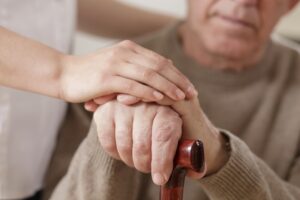 By Kathy Hubbard
By Kathy Hubbard
“My first inkling that something was not right with me was probably in graduate school,” a Georgia woman named Tyaisha Blount Dillon wrote in an article published by Newsweek last month. “I would try to lift myself out of bed after taking a nap, and it would feel so difficult. I began to regularly feel very tired and very heavy… I attributed it to rigorous school and because I was always active.”
Ten years after her graduation and numerous visits to specialists, Dillon was diagnosed with young-onset Parkinson’s disease. She said she chose to share her story because although young-onset Parkinson’s progresses differently than when the disease affects older people, getting an early diagnosis is important.
“I would like people to pay attention to their bodies a bit more,” she said. “I’m not saying to be obsessively worried, but pay attention to your body.”
Parkinson’s Foundation identifies ten warning signs of Parkinson’s disease (PD), which, as we’ve noted before, is a progressive nervous system disorder that affects movement.
“No single one of these signs means that you should worry, but if you have more than one sign, you should consider making an appointment to talk to your doctor,” they said.
“Have you noticed a slight shaking or tremor in your finger, thumb, hand, or chin? Shaking can be normal after lots of exercises, if you are stressed, or if you have been injured. Shaking could also be caused by a medicine you take,” they said. However, a tremor while at rest may indicate PD.
As we age, our handwriting might be affected by stiffness in our hands or fingers or poor vision. If our handwriting has gotten much smaller and words have gotten more crowded together, it may be a sign of PD.
Losing your sense of smell, not related to COVID-19 or the common cold, might be a red flag. “If you seem to have more trouble smelling foods like bananas, dill pickles, or licorice, you should ask your doctor about Parkinson’s,” PF said.
If you thrash around in bed or act out dreams when deeply asleep, it may be a sign of PD. Often, it’s your bed partner that notices your movements. The Michael J. Fox foundation says that when the actor Alan Alda was diagnosed with PD, what got everyone’s attention was a particular symptom he had been experiencing for years. It’s called REM sleep behavior disorder (RBD).
“This sleep condition is a lesser-known symptom of Parkinson’s that, in some people, can precede movement symptoms (tremor, stiffness, slowness) and diagnosis by years or even decades,” MJFF said.
“In RBD, a person acts out their dreams. Because these dreams often involve being chased or attacked, people will yell, punch, kick or even leap out of bed,” they said. Diagnosis for this condition typically starts with an overnight sleep study.
Other symptoms that may indicate PD include stiffness in your body, arms, and legs. It probably isn’t indicative if the stiffness goes away when you move around, but it’s a red flag if your arms don’t swing when you walk. So is stooping, slouching, or hunching over.
Dizziness or fainting could be a sign of low blood pressure. Low blood pressure is sometimes linked to PD. If you feel like you’re spinning when you regularly get out of a chair, it’s time to see your primary care provider.
Everyone will have constipation problems from time to time, but unless you can blame the medications you take or your diet, trouble moving your bowels without straining every day could also be a warning sign.
PF asks, “Have other people told you that your voice is very soft or that you sound hoarse? If there has been a change in your voice, you should see your doctor. Sometimes you might think other people are losing their hearing when you are speaking more softly.”
And, when people notice that your voice has changed, they may tell you that you look “serious, depressed or mad.” This is called facial masking and, you know what to do, call the medico.
Research is constantly finding new treatments to alleviate Parkinson’s disease symptoms. Your improved lifestyle is at your fingertips.
Kathy Hubbard is a member of the Bonner General Health Foundation Advisory Council. She can be reached at kathyleehubbard@yahoo.com.

